- Home
- G. K. Chesterton
The Napoleon of Notting Hill Page 12
The Napoleon of Notting Hill Read online
Page 12
CHAPTER I--_The Battle of the Lamps_
Mr. Buck, who, though retired, frequently went down to his big draperystores in Kensington High Street, was locking up those premises, beingthe last to leave. It was a wonderful evening of green and gold, butthat did not trouble him very much. If you had pointed it out, hewould have agreed seriously, for the rich always desire to beartistic.
He stepped out into the cool air, buttoning up his light yellow coat,and blowing great clouds from his cigar, when a figure dashed up tohim in another yellow overcoat, but unbuttoned and flying behind him.
"Hullo, Barker!" said the draper. "Any of our summer articles? You'retoo late. Factory Acts, Barker. Humanity and progress, my boy."
"Oh, don't chatter," cried Barker, stamping. "We've been beaten."
"Beaten--by what?" asked Buck, mystified.
"By Wayne."
Buck looked at Barker's fierce white face for the first time, as itgleamed in the lamplight.
"Come and have a drink," he said.
They adjourned to a cushioned and glaring buffet, and Buck establishedhimself slowly and lazily in a seat, and pulled out his cigar-case.
"Have a smoke," he said.
Barker was still standing, and on the fret, but after a moment'shesitation, he sat down as if he might spring up again the nextminute. They ordered drinks in silence.
"How did it happen?" asked Buck, turning his big bold eyes on him.
"How the devil do I know?" cried Barker. "It happened like--like adream. How can two hundred men beat six hundred? How can they?"
"Well," said Buck, coolly, "how did they? You ought to know."
"I don't know; I can't describe," said the other, drumming on thetable. "It seemed like this. We were six hundred, and marched withthose damned poleaxes of Auberon's--the only weapons we've got. Wemarched two abreast. We went up Holland Walk, between the high palingswhich seemed to me to go straight as an arrow for Pump Street. I wasnear the tail of the line, and it was a long one. When the end of itwas still between the high palings, the head of the line was alreadycrossing Holland Park Avenue. Then the head plunged into thenetwork of narrow streets on the other side, and the tail and myselfcame out on the great crossing. When we also had reached the northernside and turned up a small street that points, crookedly as it were,towards Pump Street, the whole thing felt different. The streetsdodged and bent so much that the head of our line seemed lostaltogether: it might as well have been in North America. And all thistime we hadn't seen a soul."
Map of the SEAT of WAR.]
Buck, who was idly dabbing the ash of his cigar on the ash-tray, beganto move it deliberately over the table, making feathery grey lines, akind of map.
"But though the little streets were all deserted (which got a trifleon my nerves), as we got deeper and deeper into them, a thing began tohappen that I couldn't understand. Sometimes a long way ahead--threeturns or corners ahead, as it were--there broke suddenly a sort ofnoise, clattering, and confused cries, and then stopped. Then, when ithappened, something, I can't describe it--a kind of shake or staggerwent down the line, as if the line were a live thing, whose head hadbeen struck, or had been an electric cord. None of us knew why we weremoving, but we moved and jostled. Then we recovered, and went onthrough the little dirty streets, round corners, and up twisted ways.The little crooked streets began to give me a feeling I can'texplain--as if it were a dream. I felt as if things had lost theirreason, and we should never get out of the maze. Odd to hear me talklike that, isn't it? The streets were quite well-known streets, alldown on the map. But the fact remains. I wasn't afraid of somethinghappening. I was afraid of nothing ever happening--nothing everhappening for all God's eternity."
He drained his glass and called for more whisky. He drank it, and wenton.
"And then something did happen. Buck, it's the solemn truth, thatnothing has ever happened to you in your life. Nothing had everhappened to me in my life."
"Nothing ever happened!" said Buck, staring. "What do you mean?"
"Nothing has ever happened," repeated Barker, with a morbid obstinacy."You don't know what a thing happening means? You sit in your officeexpecting customers, and customers come; you walk in the streetexpecting friends, and friends meet you; you want a drink, and get it;you feel inclined for a bet, and make it. You expect either to win orlose, and you do either one or the other. But things happening!" andhe shuddered ungovernably.
"Go on," said Buck, shortly. "Get on."
"As we walked wearily round the corners, something happened. Whensomething happens, it happens first, and you see it afterwards. Ithappens of itself, and you have nothing to do with it. It proves adreadful thing--that there are other things besides one's self. I canonly put it in this way. We went round one turning, two turnings,three turnings, four turnings, five. Then I lifted myself slowly upfrom the gutter where I had been shot half senseless, and was beatendown again by living men crashing on top of me, and the world was fullof roaring, and big men rolling about like nine-pins."
Buck looked at his map with knitted brows.
"Was that Portobello Road?" he asked.
"Yes," said Barker--"yes; Portobello Road. I saw it afterwards; but,my God, what a place it was! Buck, have you ever stood and let a sixfoot of man lash and lash at your head with six feet of pole with sixpounds of steel at the end? Because, when you have had thatexperience, as Walt Whitman says, 'you re-examine philosophies andreligions.'"
"I have no doubt," said Buck. "If that was Portobello Road, don't yousee what happened?"
"I know what happened exceedingly well. I was knocked down four times;an experience which, as I say, has an effect on the mental attitude.And another thing happened, too. I knocked down two men. After thefourth fall (there was not much bloodshed--more brutal rushing andthrowing--for nobody could use their weapons), after the fourth fall,I say, I got up like a devil, and I tore a poleaxe out of a man's handand struck where I saw the scarlet of Wayne's fellows, struck againand again. Two of them went over, bleeding on the stones, thank God;and I laughed and found myself sprawling in the gutter again, and gotup again, and struck again, and broke my halberd to pieces. I hurt aman's head, though."
Buck set down his glass with a bang, and spat out curses through histhick moustache.
"What is the matter?" asked Barker, stopping, for the man had beencalm up to now, and now his agitation was far more violent than hisown.
"The matter?" said Buck, bitterly; "don't you see how these maniacshave got us? Why should two idiots, one a clown and the other ascreaming lunatic, make sane men so different from themselves? Lookhere, Barker; I will give you a picture. A very well-bred young man ofthis century is dancing about in a frock-coat. He has in his hands anonsensical seventeenth-century halberd, with which he is trying tokill men in a street in Notting Hill. Damn it! don't you see howthey've got us? Never mind how you felt--that is how you looked. TheKing would put his cursed head on one side and call it exquisite. TheProvost of Notting Hill would put his cursed nose in the air and callit heroic. But in Heaven's name what would you have called it--twodays before?"
Barker bit his lip.
"You haven't been through it, Buck," he said. "You don't understandfighting--the atmosphere."
"I don't deny the atmosphere," said Buck, striking the table. "I onlysay it's their atmosphere. It's Adam Wayne's atmosphere. It's theatmosphere which you and I thought had vanished from an educated worldfor ever."
"Well, it hasn't," said Barker; "and if you have any lingering doubts,lend me a poleaxe, and I'll show you."
There was a long silence, and then Buck turned to his neighbour andspoke in that good-tempered tone that comes of a power of lookingfacts in the face--the tone in which he concluded great bargains.
"Barker," he said, "you are right. This old thing--this fighting, hascome back. It has come back suddenly and taken us by surprise. So itis first blood to Adam Wayne. But, unless reason and arithmetic andeverything else have gone crazy, it must be next and last blood to
us.But when an issue has really arisen, there is only one thing to do--tostudy that issue as such and win in it. Barker, since it is fighting,we must understand fighting. I must understand fighting as coolly andcompletely as I understand drapery; you must understand fighting ascoolly and completely as you understand politics. Now, look at thefacts. I stick without hesitation to my original formula. Fighting,when we have the stronger force, is only a matter of arithmetic. Itmust be. You asked me just now how two hundred men could defeat sixhundred. I can tell you. Two hundred men can defeat six hundred whenthe six hundred behave like fools. When they forget the veryconditions they are fighting in; when they fight in a swamp as if itwere a mountain; when they fight in a forest as if it were a plain;when they fight in streets without remembering the object of streets."
"What is the object of streets?" asked Barker.
"What is the object of supper?" cried Buck, furiously. "Isn't itobvious? This military science is mere common sense. The object of astreet is to lead from one place to another; therefore all streetsjoin; therefore street fighting is quite a peculiar thing. Youadvanced into that hive of streets as if you were advancing into anopen plain where you could see everything. Instead of that, you wereadvancing into the bowels of a fortress, with streets pointing at you,streets turning on you, streets jumping out at you, and all in thehands of the enemy. Do you know what Portobello Road is? It is theonly point on your journey where two side streets run up opposite eachother. Wayne massed his men on the two sides, and when he had letenough of your line go past, cut it in two like a worm. Don't you seewhat would have saved you?"
Barker shook his head.
"Can't your 'atmosphere' help you?" asked Buck, bitterly. "Must Iattempt explanations in the romantic manner? Suppose that, as you werefighting blindly with the red Notting Hillers who imprisoned you onboth sides, you had heard a shout from behind them. Suppose, oh,romantic Barker! that behind the red tunics you had seen the blue andgold of South Kensington taking them in the rear, surrounding them intheir turn and hurling them on to your halberds."
"If the thing had been possible," began Barker, cursing.
"The thing would have been as possible," said Buck, simply, "as simpleas arithmetic. There are a certain number of street entries that leadto Pump Street. There are not nine hundred; there are not ninemillion. They do not grow in the night. They do not increase likemushrooms. It must be possible, with such an overwhelming force as wehave, to advance by all of them at once. In every one of the arteries,or approaches, we can put almost as many men as Wayne can put into thefield altogether. Once do that, and we have him to demonstration. Itis like a proposition of Euclid."
"You think that is certain?" said Barker, anxious, but dominateddelightfully.
"I'll tell you what I think," said Buck, getting up jovially. "Ithink Adam Wayne made an uncommonly spirited little fight; and I thinkI am confoundedly sorry for him."
"Buck, you are a great man!" cried Barker, rising also. "You'veknocked me sensible again. I am ashamed to say it, but I was gettingromantic. Of course, what you say is adamantine sense. Fighting, beingphysical, must be mathematical. We were beaten because we were neithermathematical nor physical nor anything else--because we deserved to bebeaten. Hold all the approaches, and with our force we must have him.When shall we open the next campaign?"
"Now," said Buck, and walked out of the bar.
"Now!" cried Barker, following him eagerly. "Do you mean now? It is solate."
Buck turned on him, stamping.
"Do you think fighting is under the Factory Acts?" he said; and hecalled a cab. "Notting Hill Gate Station," he said; and the two droveoff.
* * * * *
A genuine reputation can sometimes be made in an hour. Buck, in thenext sixty or eighty minutes, showed himself a really great man ofaction. His cab carried him like a thunderbolt from the King toWilson, from Wilson to Swindon, from Swindon to Barker again; if hiscourse was jagged, it had the jaggedness of the lightning. Only twothings he carried with him--his inevitable cigar and the map of NorthKensington and Notting Hill. There were, as he again and again pointedout, with every variety of persuasion and violence, only nine possibleways of approaching Pump Street within a quarter of a mile round it;three out of Westbourne Grove, two out of Ladbroke Grove, and four outof Notting Hill High Street. And he had detachments of two hundredeach, stationed at every one of the entrances before the last green ofthat strange sunset had sunk out of the black sky.
The sky was particularly black, and on this alone was one falseprotest raised against the triumphant optimism of the Provost of NorthKensington. He overruled it with his infectious common sense.
"There is no such thing," he said, "as night in London. You have onlyto follow the line of street lamps. Look, here is the map. Two hundredpurple North Kensington soldiers under myself march up OssingtonStreet, two hundred more under Captain Bruce, of the North KensingtonGuard, up Clanricarde Gardens.[1] Two hundred yellow West Kensingtonsunder Provost Swindon attack from Pembridge Road. Two hundred more ofmy men from the eastern streets, leading away from Queen's Road. Twodetachments of yellows enter by two roads from Westbourne Grove.Lastly, two hundred green Bayswaters come down from the North throughChepstow Place, and two hundred more under Provost Wilson himself,through the upper part of Pembridge Road. Gentlemen, it is mate in twomoves. The enemy must either mass in Pump Street and be cut to pieces;or they must retreat past the Gaslight & Coke Co., and rush on my fourhundred; or they must retreat past St. Luke's Church, and rush on thesix hundred from the West. Unless we are all mad, it's plain. Come on.To your quarters and await Captain Brace's signal to advance. Then youhave only to walk up a line of gas-lamps and smash this nonsense bypure mathematics. To-morrow we shall all be civilians again."
[Footnote 1: Clanricarde Gardens at this time was no longer a_cul-de-sac_, but was connected by Pump Street to Pembridge Square.See map.]
His optimism glowed like a great fire in the night, and ran round theterrible ring in which Wayne was now held helpless. The fight wasalready over. One man's energy for one hour had saved the city fromwar.
For the next ten minutes Buck walked up and down silently beside themotionless clump of his two hundred. He had not changed his appearancein any way, except to sling across his yellow overcoat a case with arevolver in it. So that his light-clad modern figure showed up oddlybeside the pompous purple uniforms of his halberdiers, which darklybut richly coloured the black night.
At length a shrill trumpet rang from some way up the street; it wasthe signal of advance. Buck briefly gave the word, and the wholepurple line, with its dimly shining steel, moved up the side alley.Before it was a slope of street, long, straight, and shining in thedark. It was a sword pointed at Pump Street, the heart at which nineother swords were pointed that night.
A quarter of an hour's silent marching brought them almost withinearshot of any tumult in the doomed citadel. But still there was nosound and no sign of the enemy. This time, at any rate, they knew thatthey were closing in on it mechanically, and they marched on under thelamplight and the dark without any of that eerie sense of ignorancewhich Barker had felt when entering the hostile country by one avenuealone.
"Halt--point arms!" cried Buck, suddenly, and as he spoke there came aclatter of feet tumbling along the stones. But the halberds werelevelled in vain. The figure that rushed up was a messenger from thecontingent of the North.
"Victory, Mr. Buck!" he cried, panting; "they are ousted. ProvostWilson of Bayswater has taken Pump Street."
Buck ran forward in his excitement.
"Then, which way are they retreating? It must be either by St. Luke'sto meet Swindon, or by the Gas Company to meet us. Run like mad toSwindon, and see that the yellows are holding the St. Luke's Road. Wewill hold this, never fear. We have them in an iron trap. Run!"
As the messenger dashed away into the darkness, the great guard ofNorth Kensington swung on with the certainty of a machine. Yetscarcely a hundred yards further
their halberd-points again fell inline gleaming in the gaslight; for again a clatter of feet was heardon the stones, and again it proved to be only the messenger.
"Mr. Provost," he said, "the yellow West Kensingtons have beenholding the road by St. Luke's for twenty minutes since the capture ofPump Street. Pump Street is not two hundred yards away; they cannot beretreating down that road."
"Then they are retreating down this," said Provost Buck, with a finalcheerfulness, "and by good fortune down a well-lighted road, though ittwists about. Forward!"
As they moved along the last three hundred yards of their journey,Buck fell, for the first time in his life, perhaps, into a kind ofphilosophical reverie, for men of his type are always made kindly, andas it were melancholy, by success.
"I am sorry for poor old Wayne, I really am," he thought. "He spoke upsplendidly for me at that Council. And he blacked old Barker's eyewith considerable spirit. But I don't see what a man can expect whenhe fights against arithmetic, to say nothing of civilisation. And whata wonderful hoax all this military genius is! I suspect I've justdiscovered what Cromwell discovered, that a sensible tradesman is thebest general, and that a man who can buy men and sell men can lead andkill them. The thing's simply like adding up a column in a ledger. IfWayne has two hundred men, he can't put two hundred men in nineplaces at once. If they're ousted from Pump Street they're flyingsomewhere. If they're not flying past the church they're flying pastthe Works. And so we have them. We business men should have no chanceat all except that cleverer people than we get bees in their bonnetsthat prevent them from reasoning properly--so we reason alone. And soI, who am comparatively stupid, see things as God sees them, as a vastmachine. My God, what's this?" and he clapped his hands to his eyesand staggered back.
Then through the darkness he cried in a dreadful voice--
"Did I blaspheme God? I am struck blind."
"What?" wailed another voice behind him, the voice of a certainWilfred Jarvis of North Kensington.
"Blind!" cried Buck; "blind!"
"I'm blind too!" cried Jarvis, in an agony.
"Fools, all of you," said a gross voice behind them; "we're all blind.The lamps have gone out."
"The lamps! But why? where?" cried Buck, turning furiously in thedarkness. "How are we to get on? How are we to chase the enemy? Wherehave they gone?"
"The enemy went--" said the rough voice behind, and then stoppeddoubtfully.
"Where?" shouted Buck, stamping like a madman.
"They went," said the gruff voice, "past the Gas Works, and they'veused their chance."
"Great God!" thundered Buck, and snatched at his revolver; "do youmean they've turned out--"
But almost before he had spoken the words, he was hurled like a stonefrom catapult into the midst of his own men.
"Notting Hill! Notting Hill!" cried frightful voices out of thedarkness, and they seemed to come from all sides, for the men of NorthKensington, unacquainted with the road, had lost all their bearings inthe black world of blindness.
"Notting Hill! Notting Hill!" cried the invisible people, and theinvaders were hewn down horribly with black steel, with steel thatgave no glint against any light.
* * * * *
Buck, though badly maimed with the blow of a halberd, kept an angrybut splendid sanity. He groped madly for the wall and found it.Struggling with crawling fingers along it, he found a side opening andretreated into it with the remnants of his men. Their adventuresduring that prodigious night are not to be described. They did notknow whether they were going towards or away from the enemy. Notknowing where they themselves were, or where their opponents were, itwas mere irony to ask where was the rest of their army. For a thinghad descended upon them which London does not know--darkness, whichwas before the stars were made, and they were as much lost in it as ifthey had been made before the stars. Every now and then, as thosefrightful hours wore on, they buffeted in the darkness against livingmen, who struck at them and at whom they struck, with an idiot fury.When at last the grey dawn came, they found they had wandered back tothe edge of the Uxbridge Road. They found that in those horribleeyeless encounters, the North Kensingtons and the Bayswaters and theWest Kensingtons had again and again met and butchered each other, andthey heard that Adam Wayne was barricaded in Pump Street.

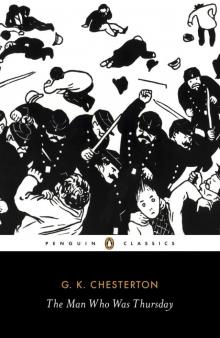 The Man Who Was Thursday: A Nightmare
The Man Who Was Thursday: A Nightmare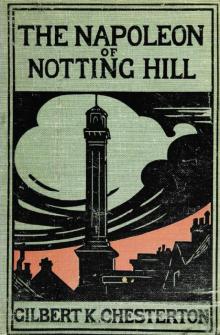 The Napoleon of Notting Hill
The Napoleon of Notting Hill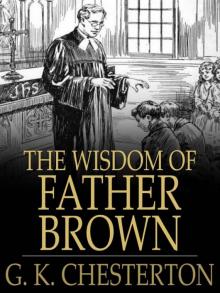 The Wisdom of Father Brown
The Wisdom of Father Brown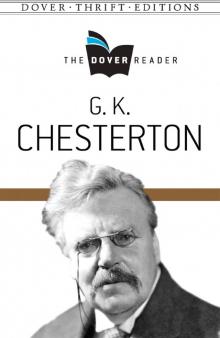 G K Chesterton- The Dover Reader
G K Chesterton- The Dover Reader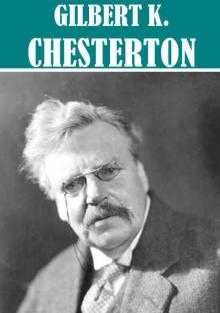 The Essential G. K. Chesterton
The Essential G. K. Chesterton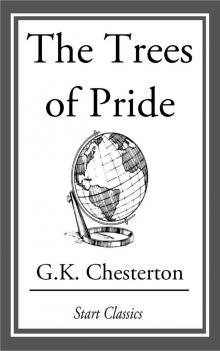 The Trees of Pride
The Trees of Pride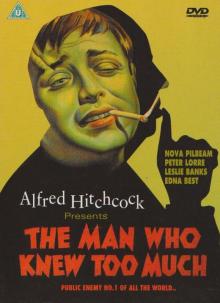 The Man Who Knew Too Much
The Man Who Knew Too Much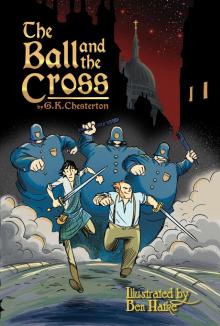 The Ball and the Cross
The Ball and the Cross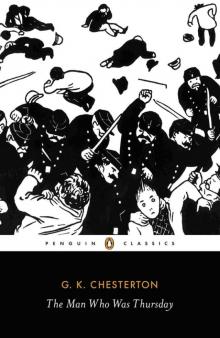 The Man Who Was Thursday (Penguin ed)
The Man Who Was Thursday (Penguin ed)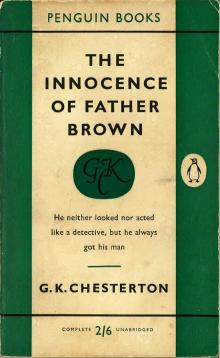 The Innocence of Father Brown
The Innocence of Father Brown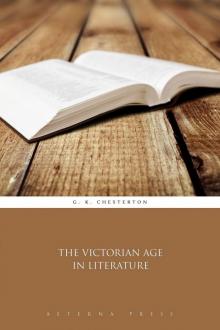 The Victorian Age in Literature
The Victorian Age in Literature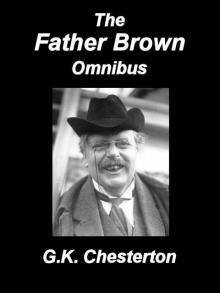 Father Brown Omnibus
Father Brown Omnibus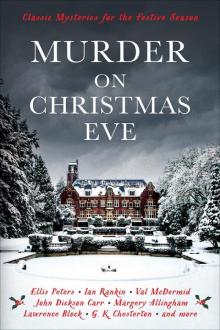 Murder On Christmas Eve
Murder On Christmas Eve The Blue Cross
The Blue Cross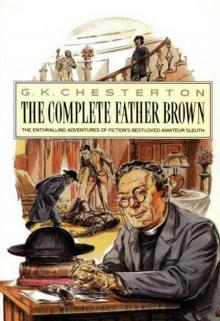 The Complete Father Brown Mysteries Collection
The Complete Father Brown Mysteries Collection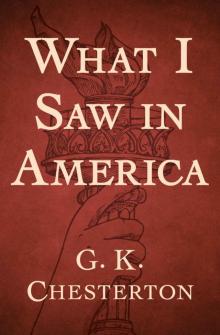 What I Saw in America
What I Saw in America